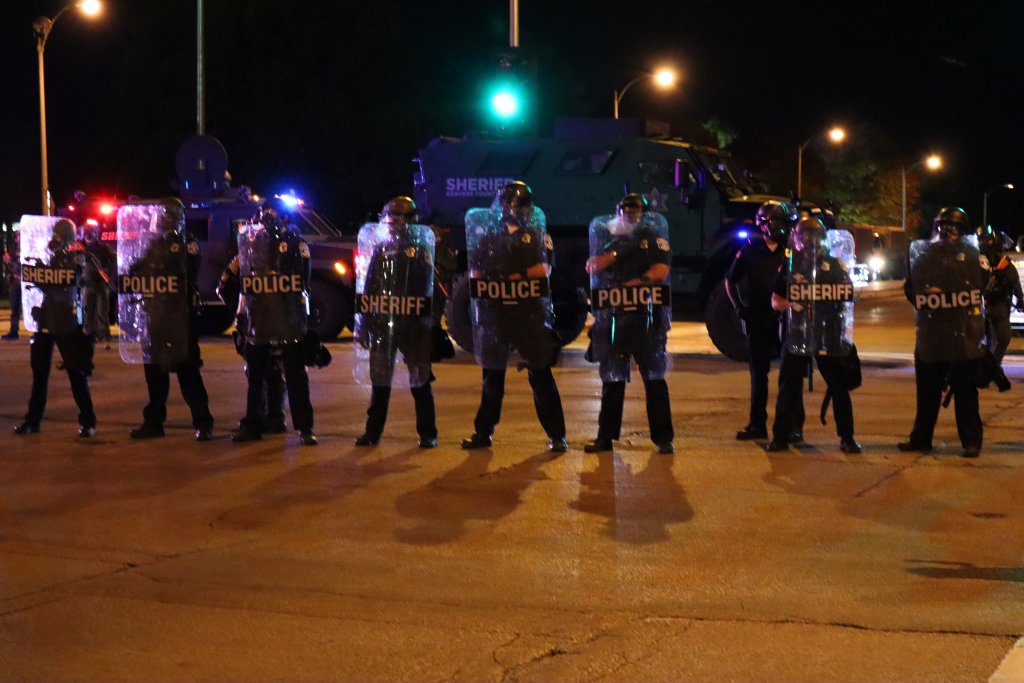Judge Throws Out First Amendment Challenge to Wauwatosa Curfew, Others Claims Remain
Remaining claim, due for trial May 1, focuses on "target list."

Riot police and National Guard confront protesters in Wauwatosa in 2020. Photo by Isiah Holmes/Wisconsin Examiner.
A federal judge has thrown out First Amendment claims raised in lawsuits over the city of Wauwatosa’s handling of Black Lives Matter protests in 2020, while leaving in place other claims, including those relating to the collection by law enforcement officers of personal information about people present during the demonstrations.
On Monday, U.S. Magistrate Judge Nancy Joseph granted summary judgment in two lawsuits that allege both the city’s curfew during the protests and actions taken by law enforcement were unconstitutional.
In one lawsuit (Knowlton, et al. v. City of Wauwatosa, et al), claims alleged that the curfew violated First Amendment rights, that an arrest was discriminatory and that defendants were victims of malicious prosecution were dismissed. The lawsuit is one of the most closely watched legal actions stemming from the protests in Wauwatosa more than two years ago.
One plaintiff, William Rivera, was driving home from work with his mother during the curfew. People who were traveling to and from work were among those who were exempt from arrest. Rivera claimed that officers told him he was being arrested because he was Black. Other plaintiffs, who claimed malicious prosecution, were arrested and cited weeks before the curfew. Their tickets were later dismissed.
Joseph dismissed similar claims about the curfew that were raised in another lawsuit (Radke v. City of Wauwatosa), as well as claims of First Amendment retaliation and excessive force. The summary judgment ruling dismissed the City of Wauwatosa, Mayor Dennis McBride and former Wauwatosa Police Lt. Jeffrey Farina from the lawsuit. Farina was involved in protest enforcement during 2020.
“It didn’t come as a surprise,” McBride, who worked as a lawyer for 43 years, told Wisconsin Examiner. “It pretty much came out as I expected it, based on my involvement in the case. But I guess, more particularly, my years and experience as a lawyer myself.”
McBride was included in the lawsuit as one of the few city officials involved in planning for the curfew that was declared in October 2020, following a decision that officers would not be charged for the shooting of Alvin Cole. The curfew was criticized for lacking justification, excluding the city council from planning, and depriving protesters of their constitutional rights. In depositions, Barry Weber, the city’s former police chief, testified that while he and other command staff at Wauwatosa Police Department made recommendations to McBride, declaring the curfew was up to the mayor. Weber retired in 2021 after more than 30 years as chief of Wauwatosa PD.
In the Knowlton lawsuit, Joseph sided with the city’s arguments that unrest in Kenosha and elsewhere justified a curfew. In Kenosha, protests and civil unrest followed the police shooting of Jacob Blake, who was left paralyzed. The unrest included $50 million in property damage and culminated in the shooting deaths of two protesters during curfew. Kyle Rittenhouse, 17, one of many armed people who came to the city in response to the unrest, was charged in the deaths and in the wounding of a third protester, but acquitted in November 2021.
Joseph’s summary judgment ruling found that the city had an interest in avoiding similar events in Wauwatosa. The ruling also concluded that plaintiffs were unable to prove that Weber ordered officers to specifically arrest people protesting police brutality.
McBride said he believes the summary judgment rulings vindicate the city.
“I’ve gone over this in my mind hundreds of times,” McBride told Wisconsin Examiner. “Looking back, I would not change any of the decisions I made. I thought about them before I made them, I didn’t just leap to conclusions.” The mayor recalled 2020 being “an extremely difficult year,” not only with the protests and COVID-19 pandemic, but also accidents on the city’s railroad tracks, a mass shooting at Mayfair Mall and other challenges.
“I feel comfortable with my decisions,” McBride said. “That doesn’t mean that it wasn’t a painful year. It was extremely painful, and it was a year filled with emotion on all sides. Protesters, counter-protesters, people on the left wing, people on the right wing. People on the right wing wanted me to stop the protests. People on the left wing wanted the police to be absent from every protest. Neither one of those things was realistic legally, or otherwise.”
McBride said that after he told protesters that the city would defend the right to protest, “I was getting attacked by the right wing for even meeting with protest leaders.”
The mayor said that the law was not always followed at the protests, causing police to intervene. Nevertheless, McBride acknowledged that the officer who shot Cole and two others over five years at the department likely would not have resigned were it not for the protests.
Joseph also dismissed some claims alleging that the “protester list” created by Wauwatosa police violated the Driver Privacy Protection Act (DPPA), but left others intact.
The curfew lawsuit may still go to trial
The claims that remain in the Knowlton case include many involving the creation and sharing of the protester list. The list was the work of the police department’s crime analyst, who gathered personal information on protesters, attorneys, journalists, elected officials and others perceived as being involved in the protests.
The analyst, Dominick Ratkowski, used Department of Transportation (DOT) information, social media, and other sources to compile the list. Ratkowski shared the list with other law enforcement agencies at multiple points, including shortly before the October curfew. At that time, Ratkowski called the document a “target list.”
The summary judgment ruling explains that the list itself indicates that some, but not all, information was obtained from the DOT. It states that 46 plaintiffs appear to have had DOT information included on their portions of the list, potentially a violation of DPPA. Those plaintiffs remain in the lawsuit.
The ruling states Ratkowski testified that “the criteria for being added to the list was merely attending a protest — the individual need not have engaged in violence or have committed a crime to be included on the list.”
The ruling adds that “furthermore, there is other evidence that suggests the list was not specifically focused on identifying potential witnesses, victims, and/or suspects of protest-related crimes. For example, Ratkowski testified that he would place plaintiffs’ counsel on the list due to his involvement in the lawsuit, even though he had not attended a protest in Milwaukee.”
Considering that testimony and the way in which the list was shared among law enforcement personnel, “a reasonable jury could conclude Ratkowski violated the DPPA,” Joseph states in the ruling. A similar determination was made for Wauwatosa Police Lt. Joseph Roy, who remains a defendant in the lawsuit.
If there isn’t a settlement beforehand, the Knowlton lawsuit is scheduled for trial May 1.
Judge dismisses more claims in Wauwatosa curfew lawsuit; others remain was originally published by the Wisconsin Examiner.



















